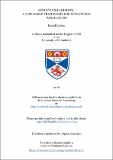Files in this item
Structured arrows : a type-based framework for structured parallelism
Item metadata
| dc.contributor.advisor | Hammond, Kevin | |
| dc.contributor.author | Castro, David | |
| dc.coverage.spatial | xiv, 255 p. | en_US |
| dc.date.accessioned | 2018-09-27T16:03:34Z | |
| dc.date.available | 2018-09-27T16:03:34Z | |
| dc.date.issued | 2018-06-27 | |
| dc.identifier.uri | https://hdl.handle.net/10023/16093 | |
| dc.description.abstract | This thesis deals with the important problem of parallelising sequential code. Despite the importance of parallelism in modern computing, writing parallel software still relies on many low-level and often error-prone approaches. These low-level approaches can lead to serious execution problems such as deadlocks and race conditions. Due to the non-deterministic behaviour of most parallel programs, testing parallel software can be both tedious and time-consuming. A way of providing guarantees of correctness for parallel programs would therefore provide significant benefit. Moreover, even if we ignore the problem of correctness, achieving good speedups is not straightforward, since this generally involves rewriting a program to consider a (possibly large) number of alternative parallelisations. This thesis argues that new languages and frameworks are needed. These language and frameworks must not only support high-level parallel programming constructs, but must also provide predictable cost models for these parallel constructs. Moreover, they need to be built around solid, well-understood theories that ensure that: (a) changes to the source code will not change the functional behaviour of a program, and (b) the speedup obtained by doing the necessary changes is predictable. Algorithmic skeletons are parametric implementations of common patterns of parallelism that provide good abstractions for creating new high-level languages, and also support frameworks for parallel computing that satisfy the correctness and predictability requirements that we require. This thesis presents a new type-based framework, based on the connection between structured parallelism and structured patterns of recursion, that provides parallel structures as type abstractions that can be used to statically parallelise a program. Specifically, this thesis exploits hylomorphisms as a single, unifying construct to represent the functional behaviour of parallel programs, and to perform correct code rewritings between alternative parallel implementations, represented as algorithmic skeletons. This thesis also defines a mechanism for deriving cost models for parallel constructs from a queue-based operational semantics. In this way, we can provide strong static guarantees about the correctness of a parallel program, while simultaneously achieving predictable speedups. | en_US |
| dc.description.sponsorship | “This work was supported by the University of St Andrews (School of Computer Science); by the EU FP7 grant “ParaPhrase:Parallel Patterns Adaptive Heterogeneous Multicore Systems” (n. 288570); by the EU H2020 grant “RePhrase: Refactoring Parallel Heterogeneous Resource-Aware Applications - a Software Engineering Approach” (ICT-644235), by COST Action IC1202 (TACLe), supported by COST (European Cooperation Science and Technology); and by EPSRC grant “Discovery: Pattern Discovery and Program Shaping for Manycore Systems” (EP/P020631/1)” -- Acknowledgements | en |
| dc.language.iso | en | en_US |
| dc.publisher | University of St Andrews | |
| dc.relation | David Castro, Kevin Hammond, and Susmit Sarkar. Farms, Pipes, Streams and Reforestation: Reasoning About Structured Parallel Processes using Types and Hylomorphisms. In Proceedings of ICFP 2016: International Conference on Functional Programming, pages 4-7, Nara, Japan, September 2016. | en_US |
| dc.relation | David Castro, Kevin Hammond, Susmit Sarkar, and Yasir Alguwaifli. Automatically deriving Cost Models for Structured Parallel Processes using Hylomorphisms. Future Generation Computer Systems, 2017. | en_US |
| dc.rights | Attribution 4.0 International | * |
| dc.rights.uri | http://creativecommons.org/licenses/by/4.0/ | * |
| dc.subject | Parallel computing | en_US |
| dc.subject | Algorithmic skeletons | en_US |
| dc.subject | Structured recursion | en_US |
| dc.subject | Hylomorphisms | en_US |
| dc.subject | Type and effect systems | en_US |
| dc.subject | Cost models | en_US |
| dc.subject.lcc | QA76.642C2 | |
| dc.subject.lcsh | Parallel programs (Computer programs) | en |
| dc.subject.lcsh | Parallel programs (Computer programs)--Verification | en |
| dc.subject.lcsh | Parallel programs (Computer programs)--Costs | en |
| dc.title | Structured arrows : a type-based framework for structured parallelism | en_US |
| dc.type | Thesis | en_US |
| dc.contributor.sponsor | University of St Andrews. School of Computer Science | en_US |
| dc.contributor.sponsor | Seventh Framework Programme (European Commission) | en_US |
| dc.contributor.sponsor | European Union | en_US |
| dc.contributor.sponsor | European Cooperation in Science and Technology (COST) | en_US |
| dc.contributor.sponsor | Engineering and Physical Sciences Research Council (EPSRC) | en_US |
| dc.type.qualificationlevel | Doctoral | en_US |
| dc.type.qualificationname | PhD Doctor of Philosophy | en_US |
| dc.publisher.institution | The University of St Andrews | en_US |
The following licence files are associated with this item:
This item appears in the following Collection(s)
Except where otherwise noted within the work, this item's licence for re-use is described as Attribution 4.0 International
Items in the St Andrews Research Repository are protected by copyright, with all rights reserved, unless otherwise indicated.


